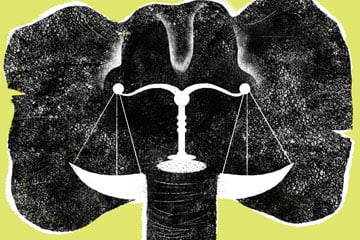Do lawyers have an ethical obligation toward animals? Should they attempt to represent animals in legal actions against negligent, neglectful or cruel owners? Should they argue that nonhumans be given legal standing before the courts?

Do lawyers have an ethical obligation toward animals? Should they attempt to represent animals in legal actions against negligent, neglectful or cruel owners? Should they argue that nonhumans be given legal standing before the courts?
The answer depends on how you resolve an existential issue. Is an animal a person or is it just a thing, a piece of property, no different from, say, a dining room chair? René Descartes, the 17th-century French philosopher, thought animals were nothing more than complex machines. Was he right? Look your cat in the eye before you answer.
Martha Nussbaum is an esteemed American philosopher. She has written recently, in The New York Times, “We humans are very self-focused. We tend to think that being human is somehow very special and important, so we ask about that, instead of asking what it means to be an elephant, or a pig, or a bird. This failure of curiosity is part of a large ethical problem.” Self-focus, adds Nussbaum, is a form of narcissism. Does this narcissism obscure the ethical obligations of humans toward fellow living creatures and prevent lawyers and the justice system from giving those creatures their legal due?
Shadow is a horse. His Oregon owner treated him very badly, eventually pleading guilty to criminal neglect. Shadow, given a new home and disingenuously renamed Justice, became a plaintiff in a civil negligence action against his former owner. Justice sought US$100,000 in damages to fund a trust that would ensure his care. The 2018 suit (Justice v. Gwendolyn Vercher) was filed on behalf of Justice by something called the Animal Legal Defense Fund. The ALDF said the claim “simply weaves together two uncontroversial, well-established legal principles: first, that animals are properly considered the victims of animal cruelty crimes, and second, that victims of crimes have a right to sue their abusers in civil court for damages for injuries caused by the defendant.”
In September, an Oregon county circuit court dismissed Justice’s case. It said: “The court finds that a non-human animal such as Justice lacks the legal status or qualifications necessary for the assertion of legal rights and duties in a court of law. . . . There are profound implications of a judicial finding that a horse, or any non-human animal for that matter, is a legal entity that has the legal right to assert a claim in a court of law. . . . Perhaps an appellate court would come to a different conclusion if it wades into this public policy debate involving the evolution of animal rights. . . . Or the Oregon Legislature could balance the public policy implications of the relief sought by Justice and craft legislation that would grant an animal the right to sue in its name for specified damages in specific instances such as a situation like this where the animal has been abused and suffered injury as a result.” The whole problem was obviously too much for the county court judge. Let an appellate court or the legislature decide. Justice, with the help of the Animal Legal Defense Fund, has appealed to the Oregon Court of Appeal.
Lucy is an elephant. She has lived in an Edmonton municipal zoo since 1977. She is the only elephant in the zoo. In 2011, animal advocates, acting as plaintiffs, sought a declaration on behalf of Lucy that the City of Edmonton was in violation of the Alberta Animal Protection Act. They wanted Lucy moved to a zoo in a warmer climate, where there were other elephants to keep her company. Their application was rejected (Reece v. Edmonton), principally for lack of standing. “No private individual,” said the judge, “can bring an action to enforce the criminal law.” An appeal to the Alberta Court of Appeal failed. Animal activists fighting on Lucy’s behalf have not given up. Most recently, they sought judicial review of a 2017 decision of Alberta’s environment and parks minister to renew the Edmonton Valley Zoo’s permit granted under the Alberta Wildlife Act. They lost at first instance, partly on the standing issue, and have appealed to the Alberta Court of Appeal.
Today, the law of most western jurisdictions, including Canada and its provinces, implicitly accepts that animals are sentient beings, sometimes defining them as such (e.g., Quebec’s 2015 Animal Welfare and Safety Act). Many Canadian law faculties teach animal law; there are several self-proclaimed animal lawyers and law firms across the country and several passionate animal rights organizations that work diligently to protect animals as best as they can.
But despite the best efforts of animal advocates and general acceptance that animals are sentient beings, it seems clear that the justice system will not consider animals as persons any time soon and will not offer them direct or indirect access to the law. (I note that the law has no difficulty regarding corporations, clearly non-sentient, as legal persons.) As things now stand, animals themselves, and those who wish to proceed on their behalf, lack standing, and only the government can intervene to protect a vulnerable animal. But what happens if the government doesn’t want to bother?
I take you back to the case of Lucy the elephant. Chief Justice Catherine Fraser dissented eloquently in the Alberta Court of Appeal decision in Reece v. Edmonton. Said the chief justice: “Some may consider this appeal and the claims on behalf of Lucy inconsequential, perhaps even frivolous. They would be wrong. Lucy’s case raises serious issues not only about how society treats sentient animals — those capable of feeling pain and thereby suffering at human hands — but also about the right of the people in a democracy to ensure that the government itself is not above the law.” Fraser would have given the appellants public interest standing. She said: “The appellants, for the public and on behalf of Lucy, are entitled to their day in court.” She was right.
A collection of these columns — How To Be Good: The Struggle Between Law and Ethics — was published last October.











